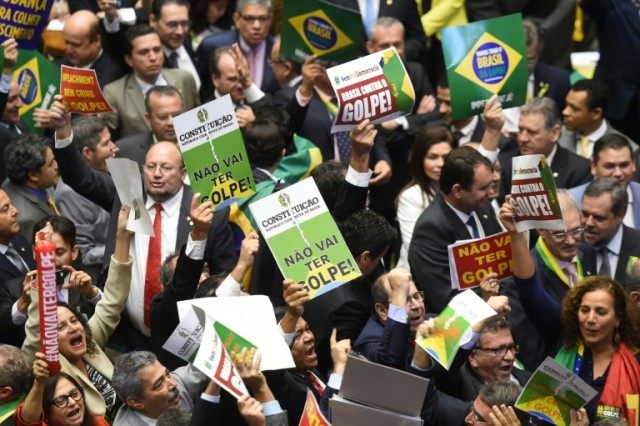Brasília (AFP) – Brazilian lawmakers fought and shouted at the opening of a session Sunday to decide whether President Dilma Rousseff should face impeachment, in a political showdown watched by millions around the deeply divided Latin American powerhouse.
Months of rancorous debate that have seen Rousseff’s ruling coalition collapse and prompted huge street demonstrations came to a head in the capital Brasilia where the lower house of Congress was to vote on whether to authorize an impeachment trial.
Tension boiled over as soon as the house speaker, Eduardo Cunha, who is a fierce Rousseff opponent, opened the session.
Rival deputies alternately shouted “There will be no coup!” or “Impeachment now!,” as well as singing the national anthem and a patriotic song regularly sung at football games.
Minutes later they were scuffling, with one group briefly unfurling a banner behind the speaker, reading “Out with Cunha!”
Latest estimates in major Brazilian newspapers were that pro-impeachment deputies in the house would succeed. They need 342 of the 513 votes, or two thirds of the house.
But Jose Guimaraes, a senior member of Rousseff’s Workers’ Party, said the opposition was “far from 342.”
Voting was to start after statements by party leaders, going on late into the evening. The whole procedure was being aired live on television to the country of 204 million, the biggest in Latin America, and also on screens erected in city squares.
Pro-impeachment deputy Antonio Imbassahy, from the PSDB party, told lawmakers they would “choose the country that we want from now on” and that Brazil needed “moral reconstruction.”
But Afonso Florence, from the Workers’ Party, urged a “democratic conscience” and attacked impeachment leaders like Cunha as corrupt.
– Street debate –
Demonstrators for and against Rousseff took to the streets across Brazil under the eye of riot police.
In Brasilia, a huge metal barrier was raised to separate rival protesters and in Rio de Janeiro, which is scrambling to organize the Olympics this August, the two sides were demonstrating at separate time slots next to Copacabana beach.
So far, the atmosphere on the streets was peaceful, even festive, with a funk band singing in Rio and protesters blowing trumpets and vuvuzuelas, as if at a football game, in Brasilia.
In Sao Paulo, the financial center, pro-impeachment supporters massed in the central Paulista avenue, many of them in the country’s green and yellow national football shirts.
Psychologist Eric Gamaliel, 29, said he’d joined the Brasilia protesters because impeachment would mean “Brazil loses a lot. The world will lose a lot. It will be a step backwards.”
But farmer Silmar Borazio, 50, who made a 20-hour journey to the capital with pro-impeachment supporters, said Brazil needs change after plunging into political chaos and its worst recession for decades.
“The first thing that needs to happen is for Dilma to leave. We are tired of producing revenue and seeing that in the end nothing improves in the country and it gets stolen,” he said.
– Last minute bargaining –
Rousseff, 68, is accused of illegal accounting maneuvers to mask government shortfalls during her 2014 reelection. Many Brazilians also hold her responsible for the economic mess and a massive corruption scandal centered on state oil company Petrobras, a toxic record that has left her government with 10 percent approval ratings.
The president and her allies lobbied frantically in a last-minute effort to turn a tide that appeared to be going against the country’s first female president. Her mentor, the fiery ex-president Luiz Inacio Lula da Silva, flew back from his home in Sao Paulo to join the final assault.
If she can prevent the opposition reaching 342 votes Sunday, she will escape, even though opposition leaders warn they will quickly launch a new impeachment attempt.
Most experts think the vote will pass.
If so, then the Senate will vote, probably in May, whether to open a trial. In case of a yes vote, which experts also consider likely, then Rousseff would step down for 180 days.
During this period she’d be replaced by her vice president Michel Temer, who has emerged as a leader of the impeachment drive. If the Senate then ended the trial with a two thirds majority in favor of ejecting her, Temer would stay on until elections in 2018.
Sylvio Costa, who heads the specialist politics website Congresso en Foco, told AFP that Rousseff was nearly sure to go, but that more trouble lies ahead.
“Whoever loses will keep protesting in the streets,” he said. “What’s certain is that the crisis will not end today.”

COMMENTS
Please let us know if you're having issues with commenting.